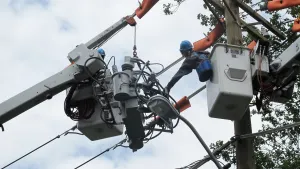More Stories
As Connecticut's 17,000 Amazon workers scramble to process millions of orders before Christmas, top Democrats plan to reintroduce a Warehouse Workers Protection Act next year. The announcement comes as Amazon workers at seven major hubs went on strike Thursday.
AMAZON STRIKE
Workers at facilities in New York and three other states went on strike Thursday morning, an effort by the Teamsters union to pressure the e-commerce giant for a labor agreement during a key shopping period.
The International Brotherhood of Teamsters claims it represents nearly 10,000 workers at 10 Amazon facilities – a small portion of the 800,000 workers employed in the company’s U.S warehouses. The union hasn’t said how many workers would participate in the strike or how long the walkout would last.
“We have Amazon drivers at Fort Lauderdale that are delivering packages in a flood,” said Ash Brooks, a striking worker in Illinois. “How are we the problem when we have Amazon workers in California who are forced to work during a heat wave?”
Amazon responded in a statement:
“For more than a year now, the Teamsters have continued to intentionally mislead the public – claiming that they represent ‘thousands of Amazon employees and drivers’. They don’t, and this is another attempt to push a false narrative. The truth is that the Teamsters have actively threatened, intimidated, and attempted to coerce Amazon employees and third-party drivers to join them, which is illegal and is the subject of multiple pending unfair labor practice charges against the union."
DANGEROUS CONDITIONS?
Shipping warehouses are big business in Connecticut. Amazon alone has invested $9.5 billion at more than a dozen facilities across the state, with a new 650,000-square-foot distribution warehouse planned for the Waterbury/Naugatuck Industrial Park.
The retail giant pays well, too. The average fulfillment worker earns $22 per hour, and even starting employees receive health benefits.
But Amazon also faces accusations of worker mistreatment, including dangerous productivity quotas.
“They cannot go to the bathroom,” Minnesota Amazon employee Khali Jama told Connecticut lawmakers in 2023. “They work 10-hour shifts, four days a week.”
That’s why top Democrats plan to reintroduce a Warehouse Workers Protection Act in January. The proposed law would limit strict production quotas, and guarantee warehouse workers food and bathroom breaks.
“It’s really nothing out of the ordinary that we're asking for,” said Senate Majority Leader Bob Duff (D-Norwalk). “We want to make sure that warehouse workers get bathroom breaks, they get proper lunch, they get regular breaks that are prescribed by law.”
The bill has failed twice before amid pushback from Amazon and business groups. Previous versions allowed workers – as well as the state – to sue companies who violate the rules. Facilities with too many injuries could also face a state labor investigation. Business groups told lawmakers that would have a chilling effect.
“This would result in injury to employees and increased turnover at a time when employers are spending exorbitant amounts of money just to find and retain employees,” said Eric Gejde, with the Connecticut Business and Industry Association testified in 2023.
AMAZON’S RECORD
Amazon says workers are not forced to meet strict production quotas and that safety incidents have dropped 28% since 2019.
But a new report from Sen. Bernie Sanders (I-Vermont) claims that “Amazon’s warehouses are far more dangerous than the company's major competitors” and that “Amazon has chosen to manipulate the data it presents to the public to hide that fact."
Sanders’ team spent 18 months investigating, hearing from 500 Amazon employees.
The company pushed back, claiming that Sanders’ report “features selective, outdated information that lacks context and isn’t grounded in reality."
“What’s actually happened over the past five years is exactly the opposite – we’ve increased our delivery speeds, while decreasing the injury rates across our network,” Amazon said in a statement. “How is that possible? Because speedy delivery doesn’t come from pushing people harder – it comes from getting products closer to customers and reducing the number of steps involved in going from a supplier to a customer. We’ve spent years re-designing our network to do just that.”
But Democratic leaders in Connecticut aren’t buying it.
“At the public hearing on this bill, we heard troubling testimony about Amazon workers in Connecticut having dramatically higher injury rates than other workers, even those in the warehousing industry. And it’s caused by their production quotas and injurious, repetitive movements,” said state Sen. Julie Kushner (D-Danbury), co-chair of the Legislature’s Labor Committee. “This is a centuries-old mindset that unfortunately still exists today, and it shouldn’t. We’ll fix that in 2025.”
More from News 12

Power center: Electric outage resources

Poll: 7 in 10 Americans saw higher utility bills from cold weather
0:19

FDA recalls oysters that may be contaminated with the norovirus
0:13

Stamford restaurant weeks begin Monday with prix fixe deals across downtown
0:53

Sacred Heart University's Discovery Science Center hosts annual Aerospace Space
0:21
